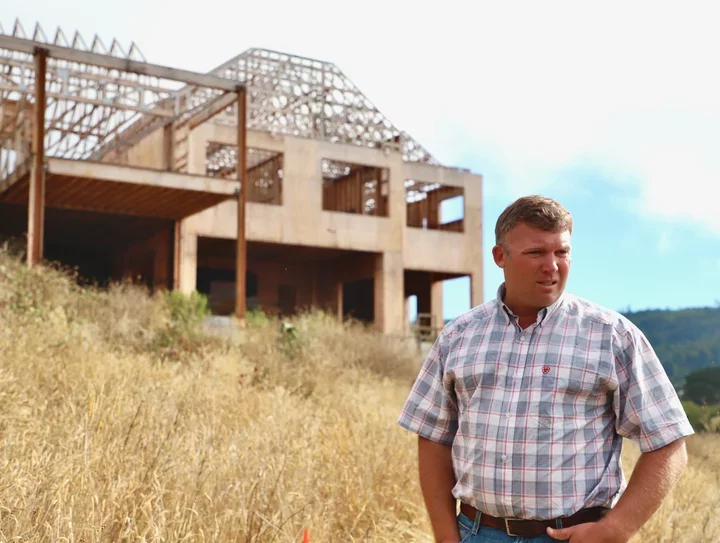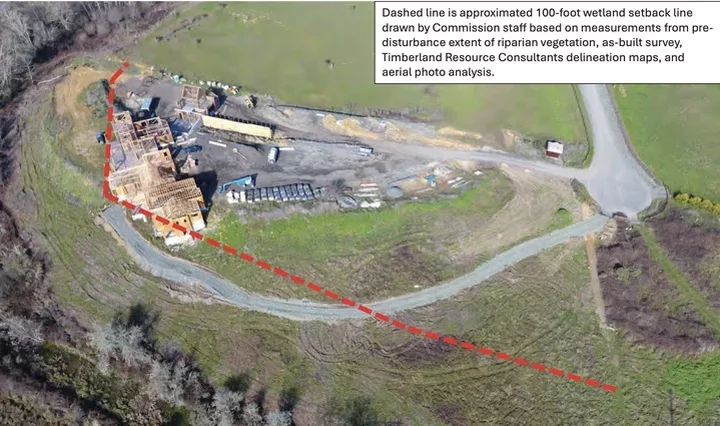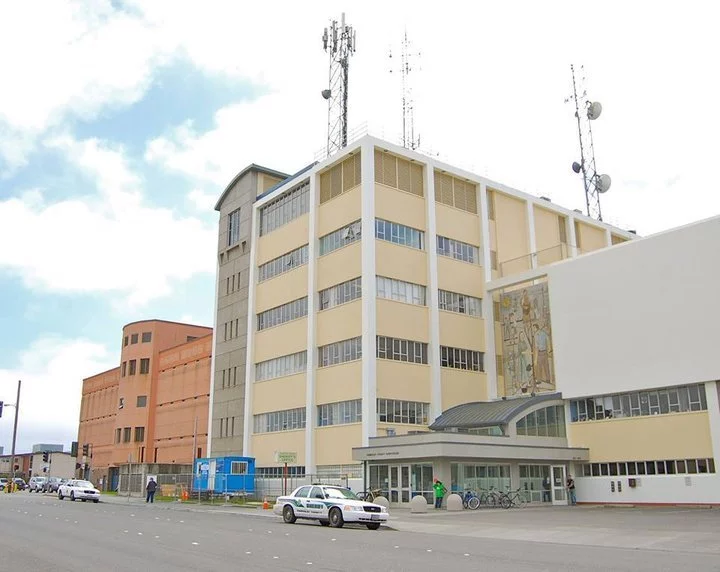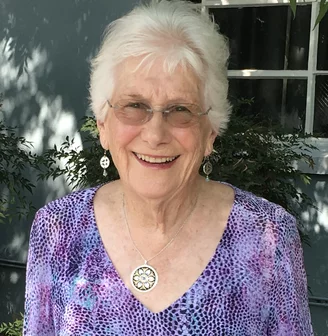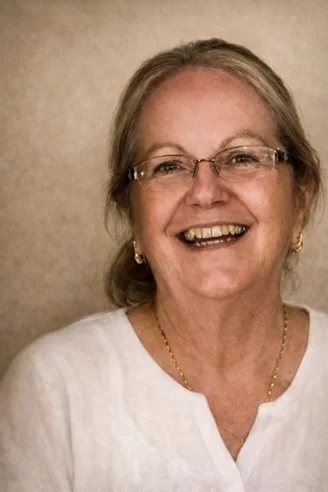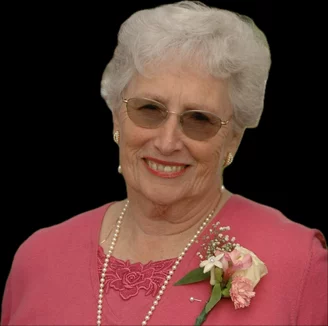Schneider Agrees to Pay $400K in Penalties for Mega-Home Permit Violations, Fully Restore Property and Then Give It to a Tribe, Nonprofit or Government Agency
Ryan Burns / Monday, Jan. 26 @ 3:06 p.m. / Environment , Government , Tribes
Formerly developer and business owner Travis Schneider stands on a slope beneath his partially built dream home in August of 2022. | File photo by Andrew Goff.
###
Travis Schneider and Stephanie Bode, local property owners who tried to build a dramatically oversized home near Humboldt Bay and accumulated serious permit violations in the process, have agreed to a sweeping settlement agreement with the California Coastal Commission that would require full ecological restoration, a $400,000 penalty and the potential transfer of more than six acres of land to local Wiyot tribes.
The proposed agreement, detailed in a Coastal Commission staff report ahead of a February 4 hearing in Half Moon Bay, would resolve years of enforcement actions involving violations at two parcels located at the end of Walker Point Road, on a bluff overlooking the Fay Slough Wildlife Area.
If you’re just tuning into this saga, here’s a brief recap:
More than four years ago, county building officials posted a stop work order at the Schneider-Bode property. Subsequent investigations revealed a host of violations to the terms of the Coastal Development Permit they’d obtained in 2017.
That permit allowed for the development of an 8,000-square-foot home on one of two adjoining parcels owned by Schneider and Bode. The permit included strict conditions designed to protect wetlands, environmentally sensitive habitat areas (ESHA) and Indigenous cultural resources. That’s because the property abuts a sensitive wetland connected to Humboldt Bay and sits atop a former Wiyot village site that, experts say, could include tribal burial grounds, tools and other cultural materials.
But rather than constructing the permitted home, Schneider and his contractors began building a 21,000-foot mansion — more than two and a half times larger than what was permitted — and did so in a different location than what had been approved.
He and his construction crews also imported around 15,000 cubic yards of fill material (roughly 10 times what was allowed); built an unauthorized gravel road on an adjacent parcel; removed protected vegetation within established wetland buffers; and conducted heavy grading and fill placement in areas known to contain highly significant Wiyot cultural and archaeological resources.
Aerial view of the Schneider-Bode parcel showing incursion into a 100-foot wetland setback. | Image via California Coastal Commission.
Schneider initially tried to finesse his way through the controversy despite conflicts with local tribes, warnings from the Coastal Commission and increased public scrutiny over the entire permitting process. He made emotional appeals to the Humboldt County Planning Commission and Board of Supervisors.
But eventually, facing daily $40,000 fines as evidence of even more permit violations surfaced, Schneider agreed through his attorney to tear down his partially built home. Even that apparent surrender hit a snag, however, when the Coastal Commission found “substantial issues” with the demolition plan. Commission staff concluded that the plan didn’t adequately protect archaeological and tribal cultural resources or the nearby ESHA.
That was nearly two years ago. Schneider and Bode, who grew up here and planned to settle with their children in that huge estate, have since decamped to Tennessee. They’ve signed on to a three-part enforcement agreement slated for Coastal Commission approval at its meeting next Wednesday.
The staff report says, “Despite the prior history that occurred on the Properties, [Schneider and Bode have] worked closely and cooperatively with Commission Enforcement staff to reach the proposed [Consent Agreement].”
Under the terms of that agreement, Schneider and Bode would:
- Remove all unpermitted development, including fill and site alterations
- Restore wetlands and habitat to pre-construction conditions, with at least five years of monitoring
- Fund tribal cultural monitors during all ground-disturbing restoration work
- Pay $400,000 in penalties, including $300,000 to the California Coastal Conservancy and $100,000 to the future land steward for ongoing care and management
- Offer both parcels (6.1 acres total) for dedication to a tribe, public agency or nonprofit — with the intent that the Blue Lake Rancheria, Wiyot Tribe and/or Bear River Band of the Rohnerville Rancheria accept the dedication.
The agreement is listed alongside a cease-and-desist order, a restoration order and the administrative penalty. If approved, it will bring this long-running saga to a close while permanently barring future development on the site.
###
PREVIOUSLY
- Heated Meeting Sparks Accusations of Dishonesty and Discrimination, Opening Rift Between Tribes and Humboldt County Planning Commission
- Despite Silence From Tribes, Mega-Home Builder Optimistic Ahead of Tonight’s Continued Planning Commission Hearing to Address Permit Violation Fallout
- A Tour Through the Half-Built Dream Mansion of Travis Schneider, Who Remains Hopeful Amid Mounting Permit Problems
- Planning Commission Set to Rescind Permit for Controversial Schneider Home as Developer Prepares to Tear it Down, Remediate Damage to Property
- Schneider Offers Emotional Apology as Planning Commission Approves Tear-Down of His Permit-Violating, Half-Built Family Dream Home
- Coastal Commission Finds ‘Substantial Issues’ With Schneider’s Plans to Demolish Half-Built Dream Mansion, Takes Over Jurisdiction of the Project
- Here’s Why Travis Schneider’s Half-Built Mansion Has Yet to be Torn Down
BOOKED
Yesterday: 4 felonies, 11 misdemeanors, 0 infractions
JUDGED
Humboldt County Superior Court Calendar: Today
CHP REPORTS
1740 Mm96 E Hum R17.40 (HM office): Traffic Hazard
Myrtle Ave / Harrison Ave (HM office): Defective Traffic Signals
ELSEWHERE
RHBB: Wet Winter, Dry Reality? Humboldt Officials Say Water Risk Isn’t Gone
RHBB: College of the Redwoods Del Norte Campus Project Moving Forward with Measure I Funding
RHBB: Major Roadwork Scheduled Friday, February 6 through Thursday, February 12
Fishing the North Coast : Finally — Rain on the Way for North Coast Steelhead Rivers
Correctional Staffers Reverse Jail Overdose with Narcan; Subject Later Found to Have Fentanyl Concealed in a Body Cavity, Sheriff’s Office Says
LoCO Staff / Monday, Jan. 26 @ 11:41 a.m. / Crime
Humboldt County Courthouse and Correctional Facility. | File photo.
###
Press release from the Humboldt County Sheriff’s Office:
On January 22, 2026, the Humboldt County Sheriff’s Office arrested Allison Trantham of McKinleyville for several drug related charges that include
- HS 11351 - Possession for Sale of a Controlled Substance.
She was transported and booked into the Humboldt County Correctional Facility.
After being booked at the facility, alert Correctional Staff noticed her losing consciousness. Staff immediately alerted on-site Medical Staff who determined Ms. Trantham to be overdosing. Emergency medical personnel were requested and two rounds of Narcan was administered. Ms. Trantham was transported to a local area hospital under guard of Correctional Staff.
After being treated at the hospital for her alleged overdose, Correctional Staff at the hospital were concerned she may still be concealing drugs in a body cavity. After a body scan was completed, it was determined that Ms. Trantham had contraband concealed in her body cavity. The items were removed with the help of medical staff, and it was determined to be an illegal narcotic.
The substance was tested and tested positive for fentanyl. In total 31 grams of fentanyl were found on Ms. Trantham at the hospital. After being medically cleared at the hospital she was subsequently brought back to the Humboldt County Correctional Facility and booked on the additional charge of
- PC 4573(a) - Smuggling Contraband into Jail.
If not for the diligence of Correctional Staff and medical personnel, this incident could have had a tragic outcome.
Anyone with information about this case or related criminal activity is encouraged to call the Humboldt County Sheriff’s Office at (707) 445-7251 or the Sheriff’s Office Crime Tip line at (707) 268-2539.
(UPDATE) Man Arrives at St. Joseph Hospital With a Stab Wound in His Back, Says He Was Attacked at Veteran’s Park in Willow Creek for No Apparent Reason, Sheriff’s Office Says
LoCO Staff / Monday, Jan. 26 @ 10:24 a.m. / Crime
UPDATE: A source with the Willow Creek Community Services District tells us that the stabbing occurred at Commons Park, in downtown Willow Creek, not at Veteran’s Park, which is out by Kimtu Beach.
###
Press release from the Humboldt County Sheriff’s Office:
On Jan. 25, 2026, at 2:25 a.m., the Humboldt County Emergency Communications Center received a report from Providence St. Joseph Hospital regarding a male subject who arrived at the hospital emergency department with a stab wound to the back.
Deputies responded to the hospital and contact the 57-year-old victim.
The victim reported that on Jan. 24, 2026, at approximately 9:00 a.m., he was at Veteran’s Park and was packing up his belongings into a bag when he observed a male subject who he did not know walked past him. Without a word being said, the subject stabbed the victim in the back with an unknown object. After the stabbing the subject ran away northbound on Highway 96.
The victim described the suspect as a male in his early 20’s with light tan skin, light-colored eyes, and short brown hair. He was described being between 5-foot-11-inches and 6-foot-1 inches tall and weighing approximately 180 pounds, wearing a light blue zippered sweatshirt with the logo “True Religion” on the front, blue Levi 501 jeans and tan cowboy boots.
The victim sustained serious but non-life-threatening injuries and was admitted to the hospital for further treatment.
This incident is under investigation. Anyone with information about this case is asked to call the Humboldt County Sheriff’s Office at (707) 445-7251 or the Sheriff’s Office Crime Tip line at (707) 268-2539.
California Cities Just Saw Their Lowest Homicide Rates in Decades. It’s Not Clear Why
Nigel Duara / Monday, Jan. 26 @ 8:03 a.m. / Sacramento
PREVIOUSLY:
###
This story was originally published by CalMatters. Sign up for their newsletters.
###
For the second year in a row, Gov. Gavin Newsom is celebrating California’s declining homicide rate while using it as a cudgel against his political foes.
“Your state’s homicide rate is 117% higher than California’s,” he told a Missouri congressman who needled Newsom on social media last summer.
Arkansas Gov. Sarah Huckabee Sanders caught his attention, too. “Your homicide rate is literally DOUBLE California’s,” he wrote on social media addressing her.
What’s been clear for the last three years is that homicides are down in Los Angeles and San Francisco — but also in Fresno, Oakland, Richmond and Lodi.
“California cities are seeing record-low homicide rates,” Newsom said in his state of the state speech earlier this month. “Oakland, the lowest since 1967; LA, the lowest since 1966; and San Francisco, the lowest since 1954.”
After a spike during the early days of the pandemic, homicides are in fact down nationwide.
The reason why is far less clear. To put it in the language of crime researchers, the answer is “multifactorial.”
Magnus Lofstrom, policy director of criminal justice at nonpartisan think tank the Public Policy Institute of California, said the spike of homicides during the pandemic may have been the result of disruptions in government activities: Schools were shut down, people were out of work, community-based programs for violence prevention and many basic public services were put on pause, Lofstrom said.
The 2020 numbers were a shock. After years of decline, the homicide rate in California surged by 31% in 2020 to 5.5 homicides per 100,000 people. In 2021, it rose again, to about 6 per 100,000 people.
But that trend began to turn in 2022, when the number of homicides dropped by 7%, then in 2023 by 14% and in 2024 by another 12%. By the end of 2024, the homicide rate in California was down to 4.3 per 100,000 people.
California’s population was about 20 million people the last time the state recorded such low homicide numbers, half of what it is today.
At the same time the homicide numbers were climbing, the percentage of cases cleared by police was falling. A police department’s “clearance rate” compares the number of crimes reported to the number of arrests made.
Lofstrom said that the homicide clearance rate statewide was 64.7% in 2019, and that it had dropped to 54.6% in 2021 – though the rates can vary dramatically among police departments.
“What we see now in the data up to 2024 is that we’re back up over 64% for homicide clearances,” Lofstrom said.
Half as many homicides in Oakland
Oakland Mayor Barbara Lee said homicides are down along with major gun crimes including robberies and assaults with firearms. Oakland’s 67 homicides in 2025 were its lowest since 1967. It had 134 homicides in 2021.
In Los Angeles, homicides dropped by more than 18% to 230 in 2025, according to a Los Angeles Times analysis of LAPD data.
The numbers documenting the recent decline in homicide rates, and the earlier spike, come with a major asterisk: The way crime data is collected is inconsistent. Law enforcement agencies self-report to the FBI, which each year publishes data under the Uniform Crime Reporting Program. The California Department of Justice then produces statewide reports from those numbers.
But not every department reports its statistics. And among those that do, some don’t report all their data — or report the information differently. For example, some jurisdictions only report crimes that lead to incarceration.
Homicide numbers in California are provided by the state Justice Department near the end of the fiscal year in June, so the most recent statistics are from 2024. The Justice Department declined to provide CalMatters with updated numbers through 2025.
The drop in homicide rates wasn’t as pronounced in Orange and Orange and Ventura counties, which never experienced a significant pandemic spike, and Kern County, where the homicide rate maintains a stubborn hold as the state’s highest.
Nationwide drop in crime
A long-range look at crime statistics, particularly homicide data, shows that the 2020-21 crime rate nationally and in California was still a fraction of its highs in the early 1990s. Simply counting the year-over-year changes belies a larger truth: Crime throughout the 2020s has been down significantly compared to the rate 20 or 30 years ago.
As with the long-term homicide rate declines, the recent tapering in California is part of a nationwide trend. A report published Thursday by the Council on Criminal Justice, a nonpartisan Washington, D.C., think tank found that among 35 major cities nationwide, homicides dropped by 21% between 2024 and 2025.
When the FBI publishes its crime statistics later this year, Council on Criminal Justice researchers said in the report that the national homicide rate could drop to 4 per 100,000 people, which would be the lowest homicide rate ever on record.
Shani Buggs, an associate professor at UC Davis and public health researcher, said in the report that cities with major decreases in their homicide rate tended to spend federal pandemic funds on violence prevention and have police departments that focused on people with repeated allegations of violent crimes, helping them quickly resume pre-pandemic clearance rates.
“We do not have reliable, multi-sector data or comparable contextual information available across jurisdictions to definitively identify — now or perhaps ever — what drove these declines,” Buggs said.
OBITUARY: Genevieve Helen Hemenway, 1928-2026
LoCO Staff / Monday, Jan. 26 @ 7:41 a.m. / Obits
Genevieve
Helen Hemenway
December 19, 1928 - January 17, 2026
Born Genevieve Helen Schlinkmann, to Hazel E. Schlinkmann (Bowman) and Fred Schlinkmann. Genevieve was adopted at a young age by her devoted, adoring father, Silvio (Botchie) Santi of Fields Landing, CA. where she lived for over eighty years.
Genevieve grew up in and around the Fields Landing Hotel and Botchie’s Crab Stand (est. 1928) both owned and operated by her parents, (Hazel and Botchie). Her early years included memories of the town as a bustling whaling port. She was enthralled by the player piano in the hotel, she would watch guests play for hours at a time. She took to the keyboard quickly as a child and her love for music grew from there, leading her to become an accomplished pianist.
After attending Field School and Eureka Senior High School, (class of 1947), Genevieve attended Humboldt State University and studied music. Her talent was noted and she was offered placement with the Philharmonic Orchestra on the east coast. Though she did not ultimately join the orchestra, her musical gift was present throughout her life. She taught her two daughters to play the piano and ukulele, and entertained several generations of family and friends with her talent throughout the years.
In December 1950, Genevieve married the love of her life, Eureka High classmate, Ellis Hemenway. It was a quick and lasting match - on their third date, Ellis asked her to marry him, and they were married for over 63 years. Two weeks after their marriage, Ellis was deployed to combat in the Korean War. Genevieve endured the longest, most difficult two years of her 97-year-long life during his deployment. Upon his return, Ellis and Genevieve were together constantly, and never spent any time apart.
Genevieve and Ellis took ownership of Botchie’s Crab Stand from Genevieve’s parents which became known throughout the Redwood Empire for selling only the freshest and highest-quality local Dungeness crab. The couple happily committed to long, hard-working days spent on their feet side-by-side working through the winter crab season year after year. The hard work and long hours offered Genevieve and her family the opportunity to spend months each year at their summer home in Dinsmore, where she could savor life.
Genevieve enjoyed hunting and fishing with family and had a deep love for the outdoors. She learned the art and science of gardening from her father and her vegetable gardens were always teeming with beautiful produce. She loved gardenias, begonias, orchids and African violets and was skilled at tending the most finicky of flowers. Genevieve was a friend to nature, always taking care to enjoy and protect the beauty she found. She instilled her love and respect for the natural world in her daughters and their growing families.
Genevieve was an accomplished cook, taking up many of the dishes and traditions of Northern Italy, her father’s homeland. Homemade gnocchi were a specialty, pillows of love covered in rich, flavorful red sauce made with chicken, pork and salami. Cakes and pies were also a specialty, and she loved to treat her family to homemade mincemeat or huckleberry pies.
Genevieve is survived by her daughters Victoria Smith and Cynthia (Iver) Skavdal; granddaughters Christine (Sergio) Mendes and Allison (Mike) Skavdal-Taylor; and grandsons Blaine Owsley, Loren (Becky) Skavdal, and Carson Skavdal; and five great-grandchildren: Christopher Mendes, Reese and Riley Skavdal-Taylor, and Marissa and Iver Skavdal. She is also survived by her niece Sandra (Norm) Ball, nephew Tom (Ardis) Schlinkmann and families.
Genevieve was predeceased by her husband, Ellis B. Hemenway, her parents, Hazel and Botchie (Silvio) Santi, her in-laws, Bernard A. and Marie (Wasmuth) Hemenway, biological father, Fred Schlinkmann, brothers Herb Schlinkmann, and Fredrick Schlinkmann.
A private graveside service will be held late January.
A special thank you to the people at Redwood Memorial Hospital, Hospice of Humboldt and Alder Bay Assisted Living Facility for their excellent, loving care.
Donations in Genevieve’s memory may be made to any of the following organizations:
Hospice
of Humboldt
3327
Timber Fall Court
Eureka,
Ca. 95503
California
Deer Association
Redwood
Coast Chapter
1884
Keystone Court
Redding,
CA 96003
By
personal check or
caldeer.org
Society
of Humboldt County Pioneers
Clark
Historical Museum
C/O
Shawn Wagner, Executive Director
240
E St.
Eureka
CA 95501
By
personal check, online
with a credit card, or
stopping by the Museum
OBITUARY: Michele ‘Mickie’ Harris, 1956-2026
LoCO Staff / Monday, Jan. 26 @ 7:39 a.m. / Obits
Michele “Mickie” Harris
November 13, 1956 – January 1, 2026
Michele “Mickie” Harris passed away peacefully on January 1, 2026, after a second courageous battle with cancer. She was at Stanford Hospital in Palo Alto, California, surrounded by family, and with her daughter by her side in the final moments.
Michele was very particular about her name, always insisting that Michele had only one “L,” and Mickie was “ie” not “ ey” like Mickey Mouse, a correction she made often and with humor. True to form, she even made sure those caring for her at Stanford corrected the spelling, giving everyone a laugh along the way.
Michele was born on November 13, 1956, in Scotia, California, to Prudence Versell Baker and Everett Harris. As a young child, she lived in Redding, California, before moving back to Bridgeville in the mid-1960s. She later graduated from Fortuna Union High School in 1974.
After high school, Michele attended DeVry Institute of Technology in Phoenix, Arizona, at a time when the computer industry was just emerging. That experience later led her to Sunnyvale, California, where she became one of Apple’s earliest employees, working with a small team assembling early Apple computers during the company’s formative years. Michele later returned to Humboldt County, where she met Robert. Together, they had one daughter, Alexis.
Michele devoted many years to caring for others in the medical field, including at Eureka Internal Medicine and later Redwood Urgent Care in Eureka, California. She deeply valued her longtime boss, Steve Mielke, and the coworkers who became like family to her and her daughter. She loved her patients and the connections she made through her work. Out of respect and care, she often left messages in obituary sections when former patients passed, honoring their lives and the bonds she had formed.
Suntan Glen and the river were home to Michele.She preferred a quieter life and felt most at home along the river.
She was a member of Jobs’s Daughters, which, to her youngest brother Chip, appeared highly suspicious. From his point of view, it involved long dresses, secret meetings, and climbing stairs into a room above Sequoia Gas, leaving him convinced for years that she had joined a cult. He has never fully ruled it out.
Family relationships were central to Mickie’s life. She and her brother Scooter were known as the “Gerber Babies,” picture perfect and inseparable. As they grew older, they argued like the Hatfields and McCoys, loud and relentless, but always out of love. Their bond bent, but it never broke.
Michele was a fantastic cook, well known for feeding family, friends, and anyone who happened to be nearby. She was a loyal and enthusiastic supporter of family sporting events, rarely missing a game. Her presence was unmistakable, thanks in part to her legendary whistle. It echoed through river valleys and gymnasiums and cut through packed crowds like a train horn. Everyone could hear it .
She was also an exceptional swimmer, moving through the river like a dolphin, fast and effortless, impossible to keep up with. She taught her daughter and many of the kids of Suntan Glen how to swim. Many learned before the age of four to swim in deep water without floaters because of her love for water ,and the importance to know how to swim if living near a lake, river or pool . She taught everyone a life lesson in team work if things went wrong.
Michele loved music and movies and was a hippie at heart. Her youngest brother Chip would often call her from concerts just to let her hear the music through the phone, knowing she would understand without a word spoken.
She had a fondness for collecting socks, the brighter and more mismatched the better, and enjoyed collecting fossils along the river. She loved to dance and sing, even if she wasn’t especially good at it, which only made it more endearing to those who knew her best.
As a mother, Michele was deeply devoted and supportive. Many of her daughter’s friends even called her “ Mom” or “ Lexi’s Mom.” If there were an “above and beyond” in motherhood, Mickie met it every day . She believed it took a village to raise a child and raised her daughter largely on her own with the help of a network she formed in order to work and provide.
Michele was deeply loved and will be greatly missed. She will be remembered for her smile, kindness, generosity, humor, heart, and especially, for being supportive and a great mother and role model.
She was preceded in death by her parents, Prudence Versell Baker and Everett Harris, along with other loved ones who went before her.
She is survived by her daughter, Alexis “Lexi” Harris (Ramer); her siblings Curtis “Scooter” Harris, Paige Harris (Asbury), and Marvin “Chip” Stewart; and many nieces, nephews, extended family members, and longtime friends.
A Celebration of Life will be held at a later date to honor both Michele and her mother, Prudence Versell Baker. Prudence passed just 7 months prior.
The family extends a sincere “ Thank you “ to the many care teams , physicians and doctors who cared for Michele with compassion and humor during her final journey.
A GoFundMe titled Honoring Michele Harris’ Life and Legacy has been established for those who wish to contribute toward Celebration of Life and final arrangements.
Mahalo and God Bless.
###
The obituary above was submitted on behalf of Mickie Harris’s family. The Lost Coast Outpost runs obituaries of Humboldt County residents at no charge. See guidelines here. Email news@lostcoastoutpost.com.
OBITUARY: Ruth Villier, 1931-2026
LoCO Staff / Monday, Jan. 26 @ 7:32 a.m. / Obits
Ruth Villier passed away on January 16, 2026, less than one month after her 94th birthday. She was the last surviving member of her generation in our family.
Margaret Ruth Neathery Schieberl Villier was born on December 25, 1931, in Sulphur, Oklahoma, to Bert Elmer Neathery and Frances Bertie “Tommy” Garrison Neathery. A few years later, they welcomed their son, Robert Lee “Bobby” Neathery.
In the early 1940s, the Neathery family moved from Oklahoma to California in search of a better life, settling in Santa Rosa. It was there, at just 16 years old, that Ruth met the handsome Ed Schieberl. They were married on December 4, 1949.
While Ed served on the front lines during the Korean War, Ruth remained in San Leandro, California, caring for their three young children—Ted, Jan, and Mike. In 1956, Ed followed his oldest brother to Humboldt County to work for the Al Nicholson Scale Company, and Ruth faithfully joined him as they began a new chapter together.
With true pioneer spirit, Mom and Dad built their first home on Greenwood Heights in the mid-1950s. A few years later, with Margie and Lucie added to the family, they built their final home on Myrtle Avenue in Eureka. During this time, Ruth cared for the household while also managing the bookkeeping—and occasionally running heavy equipment—for their newly formed business, Green Bay Scale Company. She continued this work until 1981.
Ruth was deeply involved in her children’s education. She volunteered regularly at Freshwater School as a classroom aide, brought snacks, helped teachers, and supported students in countless ways. Even after her own children moved on, she continued volunteering—first in kindergarten classrooms and later as an associate librarian. She was entrusted with some of the school’s first personal computers, which she took home, taught herself to use, and then taught others. At home, she discovered a fondness for Solitaire, which became a bit addictive. She also helped run voting booths during official elections and, alongside Ed, belonged to local horseshoe-pitching and square-dancing clubs. Mom loved to dance.
Ruth had a lifelong love for dogs, especially poodles and German Shepherds. She had many over the years, but two held special places in her heart. After Ed passed away in 1987, her German Shepherd Baron became her lifeline—getting her out of bed each morning and helping her through deep grief. Later, she welcomed a teacup poodle named Harley, who was rarely far from her side. They adored each other.
Ruth’s parents were deaf, and she served as their lifelongRuth Villier interpreter and liaison to the hearing world. She learned to speak by listening to the radio. In the 1960s and 1970s, she was a founding member of the H.I.G.H. Club (Hearing Impaired of Greater Humboldt) and was always available to assist the deaf community. She served as an on-call interpreter for courts and hospitals and taught American Sign Language courses at College of the Redwoods. She accomplished all of this without formal higher education—only grit, compassion, and life experience.In the early 1980s, Ruth traveled with her father, Bert Neathery, to Greece and Germany to attend the Oberammergau Passion Play, a once-in-a-lifetime experience she treasured.
After losing the love of her life in 1987, Ruth met life’s challenges with strength, poise, and dignity. She continued working at Freshwater School as paid staff and later found great joy when her grandchildren attended the school and she was able to see them daily.
In the early 1990s, Ruth met Vern Villier at a singles dance. They married, she sold the family home on Myrtle Avenue, retired from the school, and began a new chapter. Together, they stayed active volunteering at the Arcata Police Department, participating in the Model A Club and the Moose Lodge, and attending many social outings. Ruth especially loved dressing in period costumes for dances.
Many in the McKinleyville area knew Ruth and Vern through Ben Hurd’s Tree Farm, where they baked enormous quantities of cookies and often worked behind the cash register during the busy weeks before Christmas.
Ruth’s greatest love was her family. She is survived by her five children: Ted, Jan, Mike, Margie, and Lucie.
- Ted (Alice): Kevin and Sarah, and two great-grandchildren
- Jan: Lorraine, Olivia, and Clint, and two great-grandchildren
- Mike (Karen): Clarissa, Lilly, and Rachel
- Margie (Dave, deceased): Maricica and Timothy, and two great-grandchildren
- Lucie (Randy): Kathryn, Bethany, Leslie, Alex, Roger, Juliana, and Deborah, and 22 great-grandchildren
In total, Ruth leaves behind 17 grandchildren and 28 great-grandchildren—so far.
Whenever we spoke with Mom, she always wanted to know how her family was doing. She lovingly called us “her many blessings.” “She called us her blessings, but she was ours.
In every act of kindness, every quiet sacrifice, every moment she chose love, she shaped who we are. Though we say goodbye today, we carry her with us— in our hands, our hearts, and in the family she built so well. To be loved by her was one of life’s greatest gifts.
A memorial service for Ruth will be held on January 31st 2026 in Arcata, CA. To RSVP for catering purposes and location details, please email: ruthschieberlvillier@gmail.com
###
The obituary above was submitted on behalf of Ruth Villier’s family. The Lost Coast Outpost runs obituaries of Humboldt County residents at no charge. See guidelines here. Email news@lostcoastoutpost.com.

